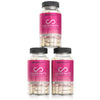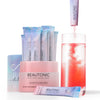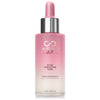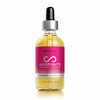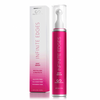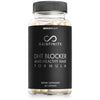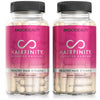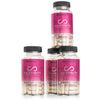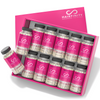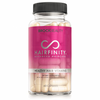
8 Vitamins For Strong Hair: How To Deal With Hair Breakage
There is nothing scarier than looking at your hairbrush and seeing a mountain of hair. It's enough to keep you up at night to see your hair fall out in chunks. That's why glancing at those hair strands would make it impossible for you to sleep comfortably. Our sedentary lifestyles and poor behaviors could be to blame for this.
Supplementing your diet with vitamins and minerals may be necessary if you are experiencing hair loss or putting yourself through wear and tear. A balanced diet, topical therapies, or supplements may all be used to achieve this goal.
These tips are for you if your hair is fading because it's brittle or thin. Let's look at eight essential vitamins and minerals that can help you better understand hair breakage and strengthen your hair.
But first, what causes hair breakage?
Causes
There could be a variety of reasons why your hair is falling out, ranging from your diet to your health. Many factors could include the following:
-
Improper Food Intake
You might do more great harm to your hair by limiting your diet. To maintain healthy hair and skin, ensure you're receiving the proper nutrients, vitamins, and minerals. Several nutrients are essential, such as iron, zinc, and folic acid. Antioxidant- and protein-rich foods should also be included in your diet.
Note:
Hair loss may be worsened by eating disorders. People with eating disorders may not be getting enough nutrition to maintain healthy hair. You may find that your hair is more prone to breakage.
-
Dryness
Damage and breakage are more likely to occur in hair that is dry and fragile. Using harsh treatments, bathing your hair too often, and shampooing it with hot water may aggravate it. In addition to causing dryness and breakage, not using a moisturizer after shampooing your hair might have the same effect.
-
Combing too hard
It is possible to break hair strands by brushing too vigorously. It may also damage your hair by ripping it out from the roots. As recommended by the American Academy of Dermatology (AAD), don't try to style your hair unless you really must.
-
Heat-Producing Styling Tools
Your hair's scales might disintegrate and break if exposed to severe temperatures. Avoid relying on them too often. Allow your hair to air out. If you use heat styling equipment, you may want to invest in a heat-protectant product.
-
Frequent usage of Chemicals on Your Hair
Chemical treatments, such as relaxers, dyeing, and perming, may cause hair to split. By over-treating your hair with chemicals or heat, you put it at risk for permanent damage. After chemically treating your hair, you should refrain from doing so for six to seven months.
-
When You Don't Allow It To Dry Normally
It's important to let your hair air dry to prevent damage over time. When you get out of the shower, your hair scalp is susceptible. Hair may be damaged by rubbing it with clothes or applying heat.
-
Excessive use of hair bands
When your hair is routinely tied, it is more likely to become tangled and break. In terms of your daily routine, it's preferable to leave things loosely tied.
-
Hypothyroidism.
Having hypothyroidism means that your thyroid glands are not making enough thyroid hormones. Hair follicles are dependent on thyroid hormones. There is a link between a deficiency in thyroid hormones, hair damage, and hair loss.
8 Essential Vitamins To Deal With Hair Breakage
There isn't a solution that works for everyone regarding hair growth. Health and immunity may be gauged from the color or texture of one's hair. In any case, hair growth depends upon a constant supply of the essential nutrients in the proper amounts. It's possible to keep your hair strong and healthy by taking a few simple supplements. Identify these individuals.
-
Vitamin A
Your hair needs Vitamin A as well as your body.
The enhanced cell growth caused by vitamin A directly impacts hair growth. While sebum is believed to keep your hair moisturized, this causes its creation. Vitamin A deficiency may result in an upsurge in hair loss, but an overdose can also do the same. The secret to good hair is to balance the number of nutrients your body is consuming.
The best sources of Vitamin A for your body include carrots, spinach, kale, eggs, milk, and yogurt. Also a vital source of Vitamin A, cod liver oil
-
Niacin
Vitamin B3 (Niacin) is a liquid vitamin often referred to as a water-soluble vitamin. Hair may grow thicker and fuller with the help of this crucial vitamin.
You may boost your hair follicles' oxygen supply using niacin. Hair follicle development is aided by opening up the blood cells on your scalp. If you don't get enough of this vitamin in your diet, it might lead to weight gain and hair loss. It also converts carbohydrates into energy and increases blood flow to the scalp. As a result, it aids in reducing body fat and the development of healthy hair.
Nutritional niacin may be found in various foods such as mushrooms, steak, seafood, and sunflower seeds and beets.
-
Biotin
As a water-soluble vitamin, biotin is part of the B-Vitamin family. One of the fastest-acting vitamins for hair development, it's also known as Vitamin H.
Biotin deficiency may cause hair thinning and hair loss. However uncommon, biotin deficiency may occur. Our hair is made up of keratin, a kind of protein. It improves the body's keratin structure. As a result, it promotes hair growth while also minimizing hair thinning.
If you eat a varied diet, you'll have no problem getting enough biotin. This essential vitamin may be found in organ meats such as liver, salmon, milk, sweet potatoes, avocados, and cauliflower.
-
Vitamin B12
The only source of vitamin B12, which helps to prevent hair loss, is animal products.
To provide oxygen to both the scalp and brain, the body needs vitamin B12, necessary for producing red blood cells. Lack of this vitamin has been linked to mood and memory improvements and hair loss. Water-soluble vitamins must be taken regularly, so keep this in mind. Your health has a role in whether or not a supplement is absorbed. For example, the body absorbs only 10mcg of a 500mcg B-12 pill. Because of this, you should rely more on a diet rather than supplements to get it.
Vitamin B12 can only be found in yeast, which is the only plant-based food that provides it. There are several sources of B-12, including organ meats, low-fat yogurt, tuna, and fortified cereals.
-
Vitamin C
Collagen, an essential nutrient for sound hair development, is produced in the body by vitamin C.
Hair dryness and splitting may occur due to a vitamin C deficiency. This, in turn, causes hair loss, although it isn't the primary cause of hair loss. Additionally, vitamin C contains antioxidants that help the body combat free radicals and keep hair follicles healthy.
Winter squashes, oranges, and kiwis are just a few of the vitamin C-rich foods that you may eat. Fruits and vegetables should make up nearly five to nine portions of your daily diet to satisfy your nutrient needs.
-
Vitamin D
When it comes to keeping your skin, hair, and bones in tip-top shape, vitamin D is necessary.
Even though it does not affect hair development directly, vitamin D does awaken any sleeping hair follicles on the scalp. Hair may sometimes grow, and sometimes it won't. Hair loss may be reduced by consuming Vitamin-D-rich foods, but it's a small price.
Vitamin D-rich foods include salmon, swordfish, ragi, mushrooms, orange juice, milk, and cereals. You can get it by directly exposing your body to the sun, but make sure you wear sunscreen to guard against the sun's harmful UV rays.
-
Vitamin E
Vitamin E may add luster to your hair as well as keep it from becoming brittle and wavy.
Antioxidant properties of vitamin E have been linked to reducing free radical damage to hair follicles. It has been proved to provide luster to hair and shield it from the sun's damaging UV rays, making it an essential vitamin for avoiding hair loss.
Nuts, seeds, oils, and fortified morning cereals are all good sources of vitamin E, as are green leafy vegetables. Among our favorites are toasted almonds and spinach cooked in wheat germ oil.
-
Prenatal Vitamins
Biotin, Omega-3 fatty acids, iron, folic acid, and other nutrients included in prenatal vitamins are critical to developing solid nails, healthy hair, and skin.
Prenatal vitamins are advised for women of childbearing age. When a woman is pregnant, she is routinely given prenatal hair growth supplements. Start taking multivitamins if you want long-lasting, healthy hair.
The majority of pregnant women take prenatal vitamins in tablets or capsules because they are promoted as such. Make sure your diet is well-balanced and diverse, with sources like liver, fish, organ meats and vegetables; cereals; and nuts or seeds.
Even better, try a hair-specific multivitamin instead. Formulated with our exclusive Capilsana Complex® blend, Hairfinity Healthy Hair Vitamins specifically targets your hair, with mega doses of the nutrients we know hair needs. Just take two capsules each day and know that you’re helping your body to do what it does best for your hair. If you don't like swallowing pills, try Candilocks Chewable Hair Vitaminsinstead.
Home Remedies for Hair Breakage
Hair breakage may be prevented by using easy, inexpensive, and safe home treatments for hair breakage. The most incredible thing about them is that you don't have to run errands to get the necessary components.
- Onion
Preventing hair breakage with onion juice is a technique to keep your locks strong. Cutting and slicing it to get to the fluid might be emotionally draining, but it is well worth it. Thanks to this sulfur-rich veggie, babies' hair is strengthened from the roots up. Your hair will be less prone to breakage as a result. Apply the juice immediately to your hair after extracting it from the fruit. After 30 minutes of repose, rinse thoroughly with water.
- Banana
For your hair, bananas can do wonders. Bananas have enough protein, fat, and potassium to keep your hair from splitting too quickly. Blend two ripe bananas with olive oil, honey, and a pinch of salt until smooth. This mixture should be applied to the hair and then covered thoroughly. Give it 15 minutes to relax. Now, thoroughly wash your hair. Using this treatment will give you hair that is full and shiny.
- Aloe vera
Aloe vera is well-known for improving the appearance of both your skin and hair. In addition to preventing dandruff and hair breakage, it also has hydrating, antibacterial, and antifungal effects. Aloe vera gel and almond oil are all that are required. Apply a generous amount to the hair and scalp after properly mixing the two ingredients. After 30 minutes, wipe it off with warm water. You may also gently apply the gel to your hair immediately.
Hair Maintenance Recommendations
To keep your hair healthy, follow these tips:
• When blow-drying, start with the lowest setting and gradually raise the heat as necessary.
• Make sure that the color you chose for your hair is at least three shades lighter or darker than your natural color.
• Increase the flow of blood to your scalp by massaging it often.
• You should have your hair trimmed every 8 to 10 weeks to maintain your hair healthy and avoid split ends from occurring.
Hair Breakage and hair fall, what's the difference?
Hail Fall
Loss of hair from the roots is referred to as "hair fall." Humans lose up to 100 strands of hair a day on average. In some instances, however, excessive hair loss might occur. Alopecia, hypothyroidism, and other medical disorders fall under this category.
Hair Breakage
The shaft of your hair may begin to fall off if it is dry and fragile. Hair loss is not caused by hair breaking. Split ends, frizzy hair, and a harsh texture are all signs that your hair is damaged. Hair breakage is less of a problem than hair loss for most people. It's also simple to fix.
Final Thoughts
Hair that is rough, frizzy, or dry may indicate that you are prone to hair breakage. In addition to genetics and environment, various additional factors may cause hair loss. Good hair care and nutrition are essential to avoid hair breakage, including regular hair washing and conditioning and a healthy diet.
















